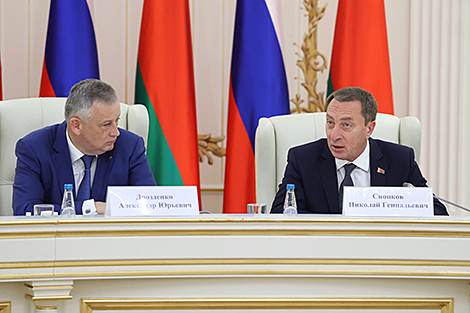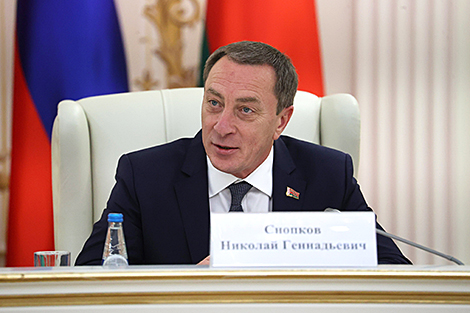Business news
Snopkov: Belarus, Russia’s Leningrad Oblast seek new vectors of development

MINSK, 27 September (BelTA) - Belarus has achieved impressive results in mutual trade with Russia’s Leningrad Oblast, and the parties continue searching for new vectors of development, Belarusian First Deputy Prime Minister Nikolai Snopkov said as he met with Leningrad Oblast Governor Aleksandr Drozdenko on 26 September, BelTA has learned.
“Our interaction with Leningrad Oblast is characterized not only by consistency, planned development, but also by a constant search for new projects, new vectors of development. This shows mutual interest in establishing production, trade, social and simply human ties. We are focused on a concrete result, and this proves the effectiveness of the implementation of the agreements we have reached. Economic tasks are of course a priority. We have achieved impressive results in mutual trade. We are likely to reach $1 billion in trade this year. We have made a good plan for 2024,” Nikolai Snopkov said.
He elaborated on the key areas of cooperation. “The first is to expand the range of supplies of Belarusian agricultural machinery and equipment. In our opinion, the construction of grain drying complexes and fodder mills looks promising. The supply of equipment to upgrade farms, technological equipment of milk processing plants also deserves attention,” the first deputy prime minister said.

Another important area is the construction of water treatment facilities. “In addition to that, we have started working out a new area of cooperation. This is the modernization or construction of fuel and energy infrastructure, including boiler houses. The parties are also discussing the possibility for Belarusian companies to take part in the implementation of the Leningrad Oblast gas supply program,” Nikolai Snopkov added.
Agro-industrial complex is one more important area. “We have a systematic, comprehensive approach to the development of cooperation in this area. We are constantly working on variety testing and introduction of new varieties in agricultural production. We are talking about perennial grasses, rapeseed, potatoes and a number of other crops. I would especially like to draw attention to joint scientific developments and research. This is really a plan for the future. We need to do this in order to have modern technologies, joint projects, high competence in the basic sectors of development, which form food security for decades to come,” the first deputy prime minister said.
He also emphasized Belarus’ interest in the implementation of the Leningrad Oblast transport reform, planned for 2024-2025. “We will make every effort to participate and provide Leningrad Oblast with high-quality and reliable Belarusian-made equipment,” Nikolai Snopkov said.

The next block is utilities and road special-purpose equipment. “These areas, in my opinion, have significant reserves for cooperation expansion. This is due to the large-scale construction of roads, and the renewal of the fleet of special-purpose (including fire) equipment, as well as intensive housing construction in the region,” the first deputy prime minister said.
Belarus is ready to step up cooperation in the construction sector as well. “The school for 825 students is our first socially oriented project in the region. Belarusian companies are interested to participate more actively in the implementation of major projects, such as the development of port infrastructure, modernization and construction of petrochemical enterprises and so on,” Nikolai Snopkov emphasized.

He also highlighted possible areas of cooperation in the future. These are systematic supplies of Belarusian construction materials, Belarus’ active participation in the implementation of a wide range of social projects, wider supplies of Belarusian metal products, possible supplies of equipment for land reclamation and peat extraction. Belarus is also ready to cooperate in reforestation efforts.
“Belarus is maximally focused on achieving a concrete practical result and positive economic effect from the implementation of our initiatives and agreements on a mutually beneficial basis,” Nikolai Snopkov said. He added that Leningrad Oblast is one of the key partners of Belarus both in economy and humanitarian sector.

Two roadmaps for 2024-2025 were signed on 26 September. The first one is to intensify cooperation between Belarus and Leningrad Oblast in trade, economic, scientific and technical areas, the second - to intensify humanitarian cooperation. “Belarus and Russia are facing many new challenges. Difficulties only make us stronger. I am convinced that our successes are based primarily on the relations of our peoples. The new roadmap pays much attention to cooperation ties and joint work on import substitution. Special emphasis is on the manufacturing industry,” Aleksandr Drozdenko said.
Belarus-Leningrad Oblast trade grew 25% to exceed $530 million in January-July 2023.







 print version
print version make home page
make home page add to bookmarks
add to bookmarks

